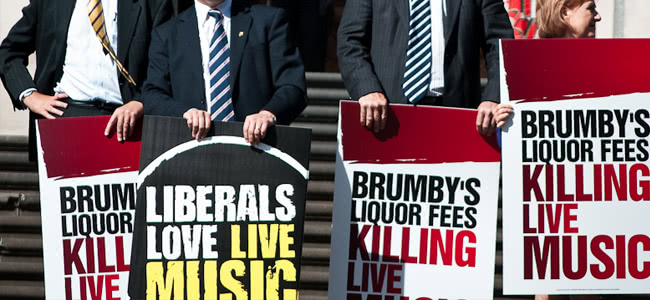Melbourne’s live music scene celebrated a major win yesterday with the news of the State Government announcing a ream of red tape reform changes aimed to better protect the city’s live music venues.
But following the official reveal of the Napthine administration’s 36 new policy changes yesterday afternoon, some of the wind has been taken out of the buoyant sails of live music advocates due to the lack of the proposed ‘Agent of Change’ planning principle.
The proverbial holy grail of policy changes, the ‘Agent of Change’ principle denotes that the party that wishes to change pre-existing conditions in an neighbourhood is the one that must pay for it.
Effectively, it makes it very difficult for new residents that move into an area (like Mr. Edmonds) with an established live music scene to batter venues with noise complaints, leading to many shutting down through costly soundproofing and legal struggles.
But despite assurances from Planning Minister Matthew Guy in State Parliament last year, the ‘Agent of Change’ principle was conspicuously absent from the Victorian Government’s policy unveiling.
Music Victoria “welcomed” the Government’s commitment to implementing the ‘Agent of Change’ among the new policies yesterday, but in a social post outlining the new changes notes “there’s still a long way to go” but that the red tape reforms are “a good start.”
The live music reforms include the recent loosening of red tape surrounding the ability for venues to host all ages shows, legislative changes to liquor licensing, the streamlining of application processes to the Victoria Commission for Gambling and Liquor Regulation (VCGLR), and better co-ordination between Police and the VCGLR to avoid doubling up of inspections, monitoring, and resources. “These matters are currently being discussed by government and no decision has been made…”
Love Music?
Get your daily dose of metal, rock, indie, pop, and everything else in between.
The cuts in red tape will certainly help loosen the bureaucratic webbing that chokes live music venues, and even encourage new sites across the city, but the protection they need against noise complaints is still perhaps the most important policy.
It’s an issue that was thrown into the spotlight recently when Collingwood’s the Bendigo Hotel dodged a costly legal dispute stirred by a single resident’s noise complaints, prompting Planning Researcher Dr Kate Shaw to warn “it’s a big issue, the population of Melbourne is growing rapidly and so is the number of complaints against music venues;” cautioning that Melbourne’s live music scene could shift to Sydney if the tide of noise complaints was not stemmed.
It was believed the ‘Agent of Change’ reform would be among the 36 policy changes due to comments from Victorian Planning Minister Guy during the final sitting of State Parliament last year.
“Whether it is through a state amendment or a local planning scheme amendment, we will find a way,” the Planning Minister said. “More to the point, we will find a way to give certainty to that industry and to that section of the population that enjoys what is one of Melbourne’s greatest tourism and cultural assets.”
But following yesterday’s policy reveal, Minister Guy says that the Government’s agenda is long-term and it will continue to work on the noise complaint issue.
“These matters are currently being discussed by government and no decision has been made,” he told The Music. “The government’s aims though are to protect live music venues in our inner city areas.”
Meanwhile, a spokesperson from the Planning Minister’s office tells FasterLouder “This is an issue that the Planning Minister together with Minister O’Donohue (Minister for Liquor and Gaming Regulation) are working on separately.”
Music Victoria CEO Patrick Donovan, whose body has been campaigning hard for measures that better protect Melbourne’s live music scene, has welcomed the positive reforms despite the absence of the ‘Agent of Change’ policy.
“Music Victoria has made a number of submissions through the Live Music Roundtable on all ages gigs, the building code of Australia, the planning system and the environment protection system, to remove regulatory burden and support the live music scene,” he says.
Mr Donovan also welcomed the Victorian Government’s “initiative to remove onerous requirements in the building code which discriminate against live music.”

































